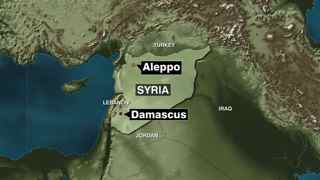 (CNN) -- Exhausted and left destitute by a seemingly endless civil war, Syrians will find out Thursday whether their government will commit to halting violence -- if only for a few days.
(CNN) -- Exhausted and left destitute by a seemingly endless civil war, Syrians will find out Thursday whether their government will commit to halting violence -- if only for a few days.
Syria is under a microscope this week as the government mulls a cease-fire proposal for Eid al-Adha, the Muslim holiday that starts Friday.
A true cease-fire would be a historic break in 19 months of endless bloodshed. But if history repeats itself, a promise of peace could just be empty words.
On Thursday, the government touted several good-will efforts leading up to its planned announcement on whether it will stop fighting.
Syrian state-run TV aired footage of men walking out from behind bars -- part of the government's latest amnesty program for criminals, a commentator said.
The timing of the release is key. It comes a week after rebel fighters told Al Jazeera that they would agree to a proposed cease-fire only if the government releases detainees, ends a siege in the city of Homs and stops aerial attacks.
But the government amnesty isn't sweeping. For example, it replaces the death penalty with a "life sentence of hard labor or long imprisonment sentence, according to the crime," state-run media reported.
Skeptics say the amnesty might simply be window dressing.
"Although Assad issued four amnesty decrees in 2011 and two others in January and May, security forces have kept many peaceful activists in detention," Human Rights Watch said, calling for all peaceful activists, journalists and aid workers to be released.
As for the rebels' second condition for a cease-fire, the government insisted that life in Homs is back to normal and called for residents to come back.
"All their needs and necessities are now available, from security to supplies and food," the state-run Syrian Arab News Agency reported.
The world now waits to see if President Bashar al-Assad's forces will stop aerial attacks on opposition targets across the country.
On Wednesday, the U.N.-Arab League special envoy to the country said the government has agreed "in principle" to stopping violence in time for Eid al-Adha, which lasts four days. During the holiday, Muslims celebrate the end of the Hajj, the annual pilgrimage to Mecca.
But even the government seems disjointed on the issue. Foreign Ministry spokesman Jihad Makdissi told CNN the idea was "still under study," and a final decision will come Thursday.
A cease-fire in April barely lasted a day before bodies started falling again. In total, more than 32,000 Syrians have died since the conflict began in March 2011, opposition activists say.
But for the violence to truly stop, rebel fighters must also lay down their weapons.
The Free Syrian Army is a loosely organized group of men fighting al-Assad's well-armed forces, and they haven't given a united statement that they would agree.
But a self-described deputy commander said Wednesday that there's pretty much no chance the rebels will trust the Syrian government.
"We don't think the regime is serious with agreeing to the cease-fire, since more than 200 people are martyred every day by the government's forces," Malek Kurdi said.
A spokesman for the Syrian National Council, an opposition coalition, echoed that pessimism.
"Based on our long experience in dealing with Assad('s) barbaric regime, we know that the Syrian government is just buying time and playing on words," said George Sabra, spokesman for the Syrian National Council, which speaks for rebels fighting al-Assad.
"The whole world knows that the Syrian regime cannot be trusted and doesn't have any credibility in fulfilling any promise that they make to anyone," said Sabra, who is based in Paris. "The crisis is too complicated in Syria, and the Assad regime is trying a diversion."
It's foolish to expect a total cease-fire, said Aram Nerguizian, a Middle East expert at the Center for Strategic and International Studies in Washington. A cease-fire in this context is about a larger goal of getting most rebel brigades and al-Assad forces to temporarily stop or reduce the killing.
But the rebels themselves are partly to blame for this spring's cease-fire failing, analyst Nerguizian said. They are disorganized and have been just as vicious in their killing as al-Assad's forces.
Getting them on the same page and having them resist the urge to fight, he said, is unrealistic.
CNN's Ashley Fantz contributed to this report.
™ & © 2012 Cable News Network, Inc., a Time Warner Company. All rights reserved.
Portland and Seattle
Free Subscription to Breaking News
Free Subscription to Breaking News























































































































































































































































































































































